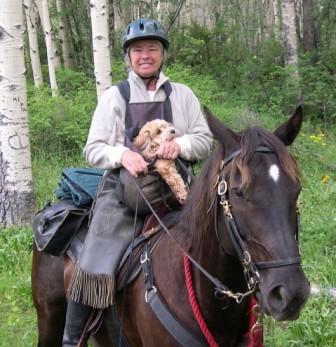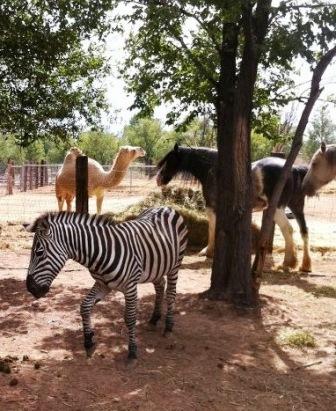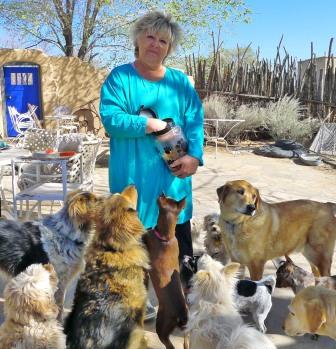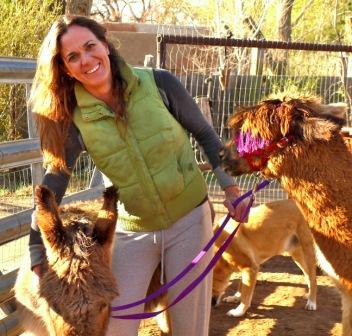Corrales is full of animal-lovers--but these ladies take it to the next level

Corrales Torch-bearer: Judy Fitzpatrick
"It used to be common--everyone did it."
When she moved to Corrales from Washington state in 1996, Judy Fitzpatrick had one dog, one cat, and a horse—perfectly normal. But she soon got infected with what she describes as the giddy atmosphere of the Village in the days before Loma Larga was a paved road.
Everyone had a lot of animals, especially the equestrian crowd she frequented. It was no big deal to see people walking their llamas down the ditch, or a herd of sheep crossing the road. Parties meant crowds of arrivals on horseback. Nowadays, when she clops down the ditch in a cart pulled by one of her miniature horses, people nearly crash their cars rubbernecking.
It takes some persuasion to convince Judy that it might be a little extreme to own three dogs, two donkeys, four horses, three llamas, six turtles, a cat, and ten chickens. “William and I were never big on Christmas presents,” she says of her husband, physician William Fitzpatrick. “So every year he would give me another animal. At one point I said no more.”
They had pygmy goats—rescues—and the llamas they bought by accident, at a fundraiser for the Corrales Library where they bid just to open the auction. The history of her horse Turp is typical, she says. The first year she owned the old quarterhorse, people would come up and say, “I used to have that horse.” Animals just got moved around to people who could care for them.
The turtles and tortoises are a different story. Judy always liked these reptiles, and she finally learned how to protect them from wanderlust and coyote predation. So people started bringing her rescues. “One year I had four people find them and bring them over, because they know I’m set up for it.” She even has a permit to keep an endangered desert tortoise.
Teaching writing classes out of a converted shed on her property, Judy found it easy to care for the animals, who as a rule get along famously. “A student once asked me, ‘What’s the animal of the week?’ And I was hurt, because it’s not like I went out to look for them,” she says, her blue eyes widening. “They found their way to me, and I was open.”
Besides, everyone did it. “There was a time when I could get you anything you wanted,” she confides. She finds it sad that Corrales demographics have changed—and that the cost of feed and veterinary care mean few people can afford to keep a whole ranch full.
Never an animal rescuer, and adamantly not a hoarder, Judy says re-homing animals was just a way of life here. “It doesn’t seem strange at all. That’s the way it was.

Recovering Animal Addict: Bentley Kassemi
"I have a firm belief that inside every animal rescuer is an animal hoarder."
The first signs of her affliction emerged at age 10, when young Bentley joined Wildlife Rescue Inc. and learned to care for injured wildlife. Blessed with terribly tolerant parents (Corrales real estate agents Chuck and Trisha Dawson), she supplemented her habit with pets—dogs, cats, parrots, ducks, horses, and sheep—which was easy to do on the family’s sprawling property along the Corrales acequia.
Marriage to a man who had grown up without pets did not cure her. Recognizing her need for pastures and barns, her parents generously agreed to trade houses with her, putting her back on the three-acre property where it all began. In 2005, when a friend brought her to the Southwest Livestock Auction in Los Lunas (a.k.a. Dennis Chavez’ infamous “sale barn” where horses are auctioned for slaughter), Bentley came home with five horses, launching her career in rescue.
Early experience with wildlife made her especially vulnerable to exotics. Over the years she has owned a camel and a zebra, an untold number of parrots, and has facilitated the adoption of a monkey and a tamarind, among other unorthodox pets. Not surprisingly, she has a close relationship with Corrales Animal Control, which is allowed on her property anytime without notice, and might even be said to have enabled her habit.
After all, they were the ones who brought over the llama as a companion for her camel. The 14-yearold dromedary from a petting zoo in Lubbock was found on Craigslist. Her husband had offered a honeymoon promise in Egypt that she could someday have her very own camel. Little did he suspect that she would take him up on it.
“I lucked out,” she grins. “I got the sweetest camel on the planet. He would put his head on your lap. He loved peppermints and would do anything for them.”
Not so the zebra, sold to her by a friend who bought the half-starved creature at a horse auction. “What they don’t tell you is that zebras are mean,” Bentley adds. The wild stud was so rambunctious, he had to be darted for routine veterinary care.
Sadly, Bentley’s little zoo has all been adopted out. In the midst of a divorce, with an infant child, she quickly realized that the ranch was too much to handle while she was in school studying hypnotherapy.
“You go through burnout, and there’s a point where you have too many,” she says of her decades in animal rescue. One summer she had more than 100 parrots pass through; another year it was 30 horses. “Good rescuers go in and out of it,” she says, a wink in her voice—which begs the question of whether Bentley has really recovered at all.

Dog's Best Friend: Lisa Miller
"They're brought to me. It's a God thing."
Since her first rescue dog back home in Michigan, Lisa Miller has never met a dog she didn’t like. This is quite fortunate for them, and maybe not so fortunate for her—and even less fortunate for the 14-year-old cat who lives in a house ruled by eleven dogs.
As Lisa moves around the house, the pack follows—big dogs, little dogs, mellow dogs, jumping dogs. She says her roommate used to have three dogs of his own, and whenever she got him to mop the floor, a herd of dogs would follow back and forth, back and forth.
Lisa moved here from California in 1988 with a crew of six dogs and two cats. Now that she is settled on a roomy acre on the west side of Loma Larga, her brood has grown larger still, to what she claims is the outside limit on dogs.
“Usually I have six to eight,” she says, adding with a shrug, “but never say never.”
Dogs have a knack for finding rescuers, and Lisa is no exception: Most dogs walk into her life as strays for which the owner cannot be found. In Corrales, Lisa found other chronic rescuers who have only served to feed her soft-hearted proclivities. Four of her dogs came through Joyce Fay of Bro & Tracy Animal Rescue. Barbara Bayer of CAR MA finally told her, “We want you to foster dogs you don’t like. Oh—that doesn’t happen, does it?”
Not yet, anyway. Whenever she takes in a foster dog, Lisa finds it exceedingly hard to say goodbye. So now they don’t leave. Instead, she makes her home with eleven dogs, one cat, six horses, two birds, and a variable population of bees.
Inside the three-bedroom house, the common areas all appear to be “dog rooms,” but none more than Lisa’s bedroom—basically a bed moored in an ocean of dog cushions and beds. Sequestered in a room in back, her old cat attempts to live most of its life at table height, stepping gingerly over bookcases to dine on a shelf near the ceiling.
“You do make compromises,” Lisa notes, though she has (like most ark captains) gotten the feeding routine down to less than one hour before work.
As breadwinner to her brood, Lisa puts in long hours as an auto claims adjuster, and any money left over tends to get donated to animal causes. Her family and friends think she’s nuts, she admits. But “I think that’s what we need to do,” she says simply.
A friend working in her garden shrugs and offers, “Well, I collect a lot of plants.” Lisa points out that several families in the immediate neighborhood also have ten or more dogs. In Corrales, it seems, animal addicts like Lisa have little hope of recovery.

The Animal Whisperer: Jen Verhoog
"They all have names, songs, and a retirement plan."
